Wild bergamot brings a delightful twist to your tea with its unique flavor profile. You'll experience a revitalizing minty taste paired with earthy undertones. Subtle hints of spice enhance the richness, while a touch of citrus elevates the overall experience. This versatile herb can invigorate various tea blends, making it a popular choice among herbal enthusiasts. The aroma is reminiscent of a blooming garden, creating an inviting atmosphere. If you're curious about how to best prepare this herb or which other flavors pair well, there's so much more to discover.
Overview of Wild Bergamot
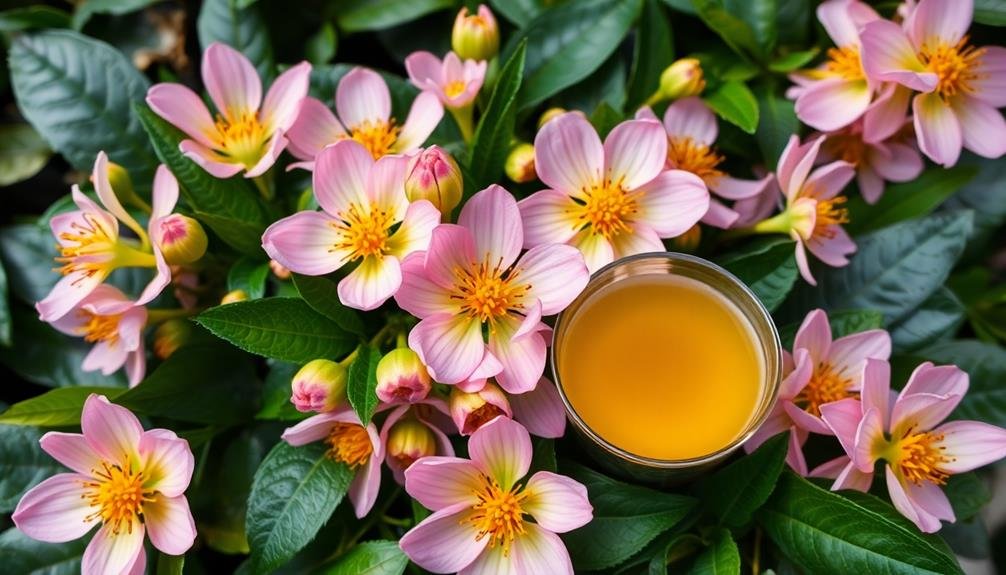
Wild bergamot, also known as Monarda fistulosa, is a fragrant herb native to North America, prized for its aromatic leaves and vibrant flowers.
You'll often find it growing in open fields, meadows, and along roadsides, thriving in well-drained soil and full sunlight. This perennial plant can grow anywhere from two to four feet tall, boasting clusters of purple-pink flowers that attract a variety of pollinators, including bees and butterflies.
The leaves of wild bergamot are particularly remarkable, as they're rich in essential oils, giving them a distinct, invigorating scent reminiscent of mint and oregano.
You might enjoy the soothing aroma when you crush the leaves between your fingers. Traditionally, Native Americans have used wild bergamot for its medicinal properties, making it a staple in herbal remedies.
As you explore its uses, you'll find that wild bergamot is often incorporated into teas and infusions, not just for its health benefits but also for its striking visual appeal.
With its unique characteristics, this herb serves as a wonderful addition to any garden or herbal collection, offering beauty and utility in your culinary creations.
Flavor Profile of Wild Bergamot
The flavor profile of bergamot is a delightful blend that combines minty freshness with earthy undertones. When you sip tea infused with wild bergamot, you'll first notice its vibrant, invigorating aroma, reminiscent of a garden in full bloom. This minty quality can awaken your senses, making each sip revitalizing and lively.
As the flavor unfolds, you'll encounter subtle notes of spice that add depth to the overall experience. The earthy undertones ground the flavor, providing a balanced contrast to the bright mint. You'll appreciate how these elements work together, enhancing your tea without overpowering it.
If you're looking for something unique, wild bergamot also introduces a hint of citrus, which can elevate the drinking experience. This citrusy twist complements the other flavors, making your tea not just a drink, but a journey of taste.
Wild bergamot's complexity makes it a versatile addition to various tea blends. Whether you're enjoying a classic black tea or a soothing herbal infusion, its flavor profile brings a rejuvenating twist that keeps you coming back for more.
Historical Uses in Tea
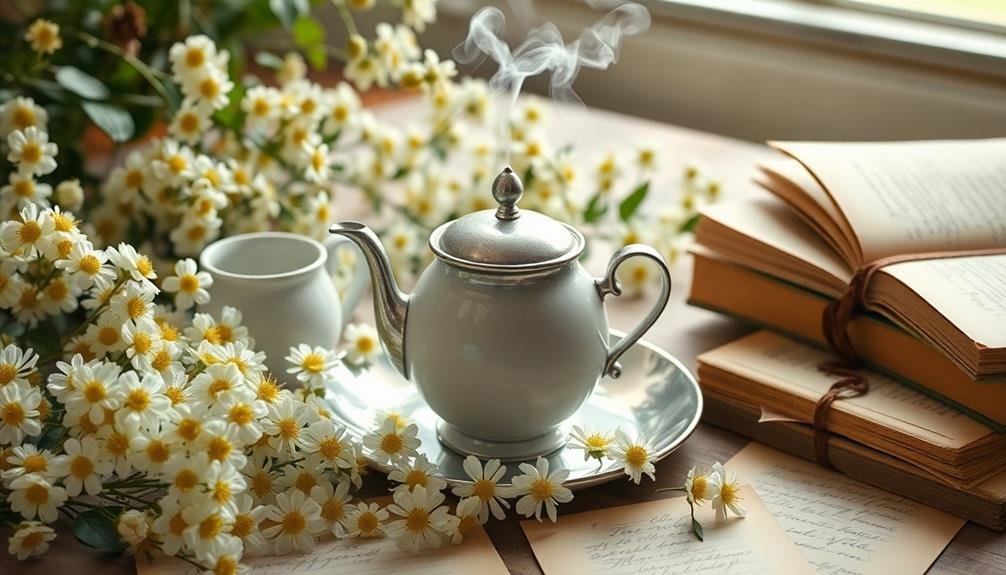
Throughout history, herbalists and tea enthusiasts have embraced bergamot for its unique flavor and potential health benefits. You'll find that this herb has roots in traditional medicine, often used to soothe ailments like digestive issues and respiratory problems. It's fascinating to note how bergamot's appeal has evolved over the years.
In the 19th century, bergamot became a popular ingredient in tea blends, especially Earl Grey. Its citrusy notes provided an uplifting twist to black tea, making it a favorite among tea drinkers.
Here's a quick overview of bergamot's historical uses in tea:
| Time Period | Uses in Tea | Benefits |
|---|---|---|
| Ancient Times | Used for digestion | Helps with stomach issues |
| 18th Century | Flavored black tea blends | Enhanced taste |
| 19th Century | Earl Grey tea popularity | Uplifting aroma |
| Early 20th | Infusion for respiratory health | Eases coughs |
| Modern Era | Herbal tea blends | Relaxation and wellness |
As you can see, bergamot's legacy in tea is rich and varied, showcasing its enduring appeal across generations.
Pairing With Other Herbs
While exploring the flavors of wild bergamot, you'll discover that pairing it with other herbs can elevate your tea experience. The unique citrusy and minty notes of wild bergamot create a delightful foundation for blending. By combining it with complementary herbs, you can enhance both the flavor and aroma of your tea.
Consider these herb pairings to make your wild bergamot tea truly exceptional:
- Peppermint: The coolness of peppermint balances wild bergamot's warmth, creating a revitalizing blend.
- Lemon Balm: This herb adds a gentle lemony hint that brightens the overall flavor profile.
- Chamomile: The sweet, floral notes of chamomile soften wild bergamot's sharper edges, offering a calming tea.
- Thyme: A touch of thyme introduces earthy undertones, adding complexity to your brew.
- Lavender: The floral fragrance of lavender complements wild bergamot's zest, creating a soothing experience.
Experiment with these pairings to find the perfect balance that suits your taste.
Whether you prefer something invigorating or calming, these combinations will enhance your wild bergamot tea journey. Enjoy crafting your own signature blends!
Health Benefits of Wild Bergamot
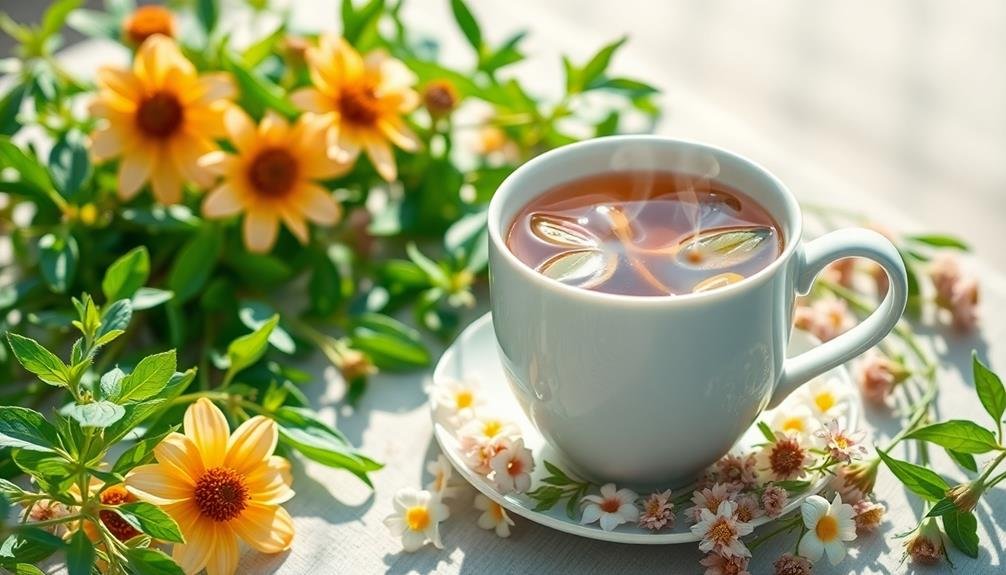
Wild bergamot isn't just a flavorful addition to your tea; it also packs a punch when it comes to health benefits.
You'll find its antioxidant properties help protect your cells, while its support for your immune system can keep you feeling vibrant.
Plus, it may aid in digestion, making it a great choice for overall wellness.
Antioxidant Properties Explained
Packed with antioxidants, wild bergamot offers a range of health benefits that can enhance your overall well-being.
These powerful compounds help neutralize free radicals in your body, reducing oxidative stress and lowering the risk of chronic diseases. When you incorporate wild bergamot into your tea, you're not just enjoying its unique flavor; you're also giving your body a boost of protective elements that support your health.
Here are some key benefits of the antioxidants found in wild bergamot:
- Heart Health: Antioxidants can improve blood circulation and reduce cholesterol levels.
- Anti-Inflammatory: They help lower inflammation, which is linked to various health issues.
- Skin Protection: Antioxidants can combat signs of aging and protect skin from environmental damage.
- Digestive Aid: They promote gut health by supporting a balanced microbiome.
- Mood Booster: Some antioxidants may improve mental clarity and reduce anxiety.
Incorporating wild bergamot into your daily routine can be a delicious way to reap these benefits while enjoying a soothing cup of tea.
Immune System Support
Antioxidants in wild bergamot not only protect your body from oxidative stress but also play a significant role in supporting your immune system.
These antioxidants, such as flavonoids and polyphenols, help neutralize free radicals, which can weaken your immune defenses. By incorporating wild bergamot into your tea, you're giving your body a powerful ally in its fight against illness.
Moreover, wild bergamot has antimicrobial properties that can help fend off infections.
When you brew a cup of wild bergamot tea, you're not just enjoying a pleasant flavor; you're also potentially reducing your risk of catching colds or other infections. Its essential oils may enhance your body's ability to fight pathogens, promoting overall health.
Additionally, the anti-inflammatory effects of wild bergamot can help reduce inflammation in the body, which is vital for a well-functioning immune system.
Chronic inflammation can lead to various health issues, so reducing it can support your overall well-being.
Incorporating wild bergamot into your daily routine not only elevates your tea experience but also boosts your immune resilience, keeping you healthier and more vibrant.
Enjoy a cup of wild bergamot tea and support your immune system today!
Digestive Health Benefits
Enjoying a soothing cup of bergamot tea can do wonders for your digestive health. This fragrant tea not only offers a delightful flavor but also provides several benefits that can help you feel great.
Wild bergamot contains compounds that may aid digestion by stimulating your gastrointestinal system, making it easier for your body to process food. Additionally, it has been known to alleviate symptoms like bloating and gas, allowing you to enjoy your meals without discomfort.
Its calming properties can help reduce stress, which is often a contributor to digestive issues.
To make the most of your bergamot tea experience, consider these tips:
- Brew it with fresh ingredients: Add fresh ginger or lemon for an extra digestive boost.
- Enjoy it warm: Warm tea is comforting and can help soothe your stomach.
- Pair it with meals: Sipping it after a meal can help aid digestion.
- Practice mindfulness: Take a moment to relax and enjoy your tea, allowing your body to digest more effectively.
- Stay hydrated: Drink plenty of water alongside your tea for ideal digestion.
Incorporating wild bergamot tea into your routine can truly enhance your digestive well-being.
Tips for Foraging and Preparation
When foraging for wild bergamot, keep an eye out for its distinct minty aroma and vibrant purple flowers, which can often be found in sunny meadows or along roadsides.
It's best to forage in late summer when the flowers are in full bloom. Always verify you're in an area free from pesticides or pollutants, as these can affect the plant's flavor and safety.
Once you've gathered your wild bergamot, rinse the leaves and flowers under cool water to remove any dirt or insects.
You can use the fresh leaves and flowers immediately in your tea, or you can dry them for later use. To dry, spread them out in a single layer on a clean cloth or paper towel in a well-ventilated area, away from direct sunlight. This helps preserve their flavor and aroma.
When you're ready to brew, steep about 1 to 2 teaspoons of dried bergamot per cup of hot water for five to ten minutes, depending on your taste preference.
Feel free to experiment by combining wild bergamot with other herbs or teas to create your unique blends! Enjoy the invigorating flavors!
Frequently Asked Questions
Is Wild Bergamot Safe for Children to Consume in Tea?
While wild bergamot is generally considered safe for adults, you should consult a pediatrician before giving it to children. Individual sensitivities can vary, so it's best to ascertain it's appropriate for their age and health.
Can I Use Dried Wild Bergamot Leaves for Tea?
Yes, you can use dried wild bergamot leaves for tea. Just steep them in hot water for a few minutes, and you'll enjoy a flavorful, aromatic beverage that's both revitalizing and soothing. Enjoy your tea!
What Is the Best Time to Harvest Wild Bergamot?
You should harvest wild bergamot in mid to late summer when the flowers are fully open. This guarantees you get the most flavor and potency. Early morning is ideal, as the essential oils are most concentrated then.
Are There Any Allergies Related to Wild Bergamot?
Yes, some people can be allergic to wild bergamot. If you experience symptoms like skin irritation or respiratory issues after exposure, it's best to avoid it and consult a healthcare professional for advice.
How Long Does Wild Bergamot Tea Last When Stored?
When you store wild bergamot tea properly in a cool, dark place, it lasts about 6 to 12 months. Just make sure it's in an airtight container to maintain its flavor and freshness.
In Summary
Incorporating wild bergamot into your tea can elevate your experience with its unique floral and minty flavors. This herb not only enhances your brew but also carries historical significance and health benefits. By pairing it with other herbs, you can create a delightful, aromatic blend. Remember to forage responsibly and prepare it properly to enjoy its full potential. So, why not give wild bergamot a try in your next cup of tea? You might just discover a new favorite!

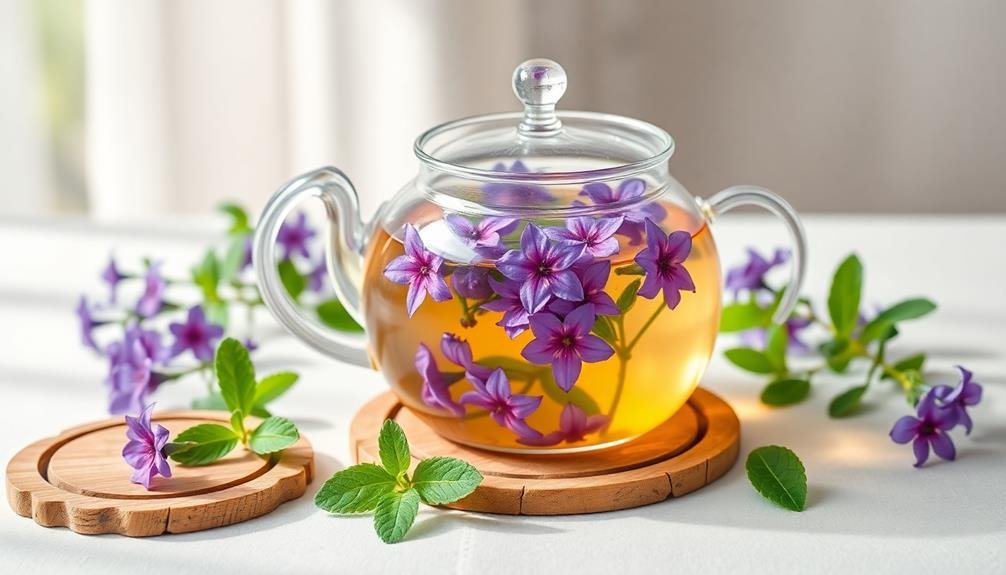
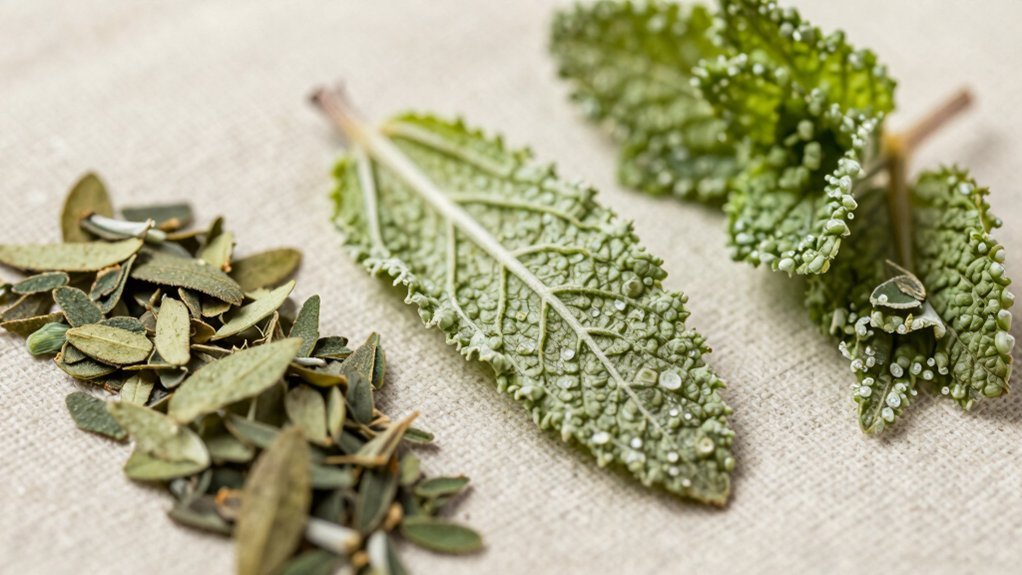

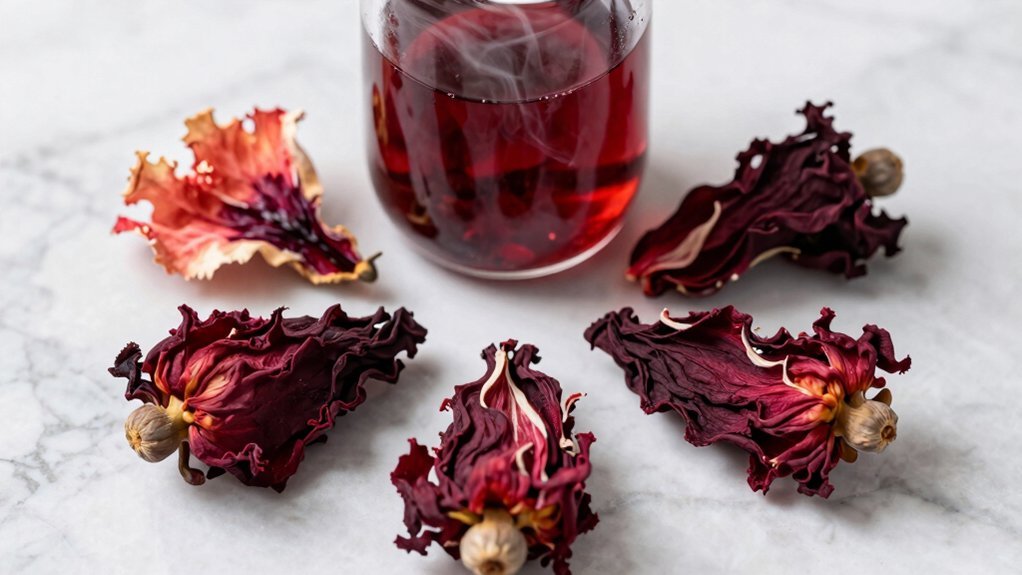
Leave a Reply